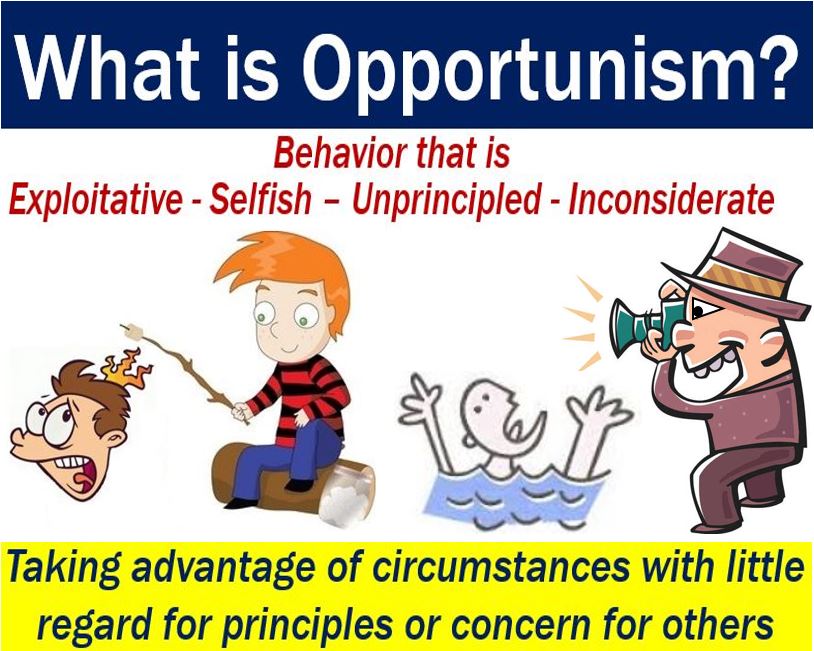Opportunism – definition and meaning
Opportunism is the practice of taking advantage of opportunities as and when they arise. The person who does this is an opportunist. Opportunism involves exploiting circumstances purely for self-interest. The opportunist has no regard for other people’s interests or moral principles. In other words, what they do is exploitative, selfish, inconsiderate, and unprincipled.
When we say that somebody is an opportunist, we are criticizing them. Specifically, we are criticizing them for exploiting a situation to gain money or power. That person does not think about whether their actions are right or wrong.
Even if they are aware that their actions might be wrong, opportunists do not care.
Opportunists lack ethics. Ethics are the moral principles that govern how we behave at work and in our everyday lives.
According to the English Oxford Living Dictionaries, opportunism is:
“The taking of opportunities as and when they arise, regardless of planning or principle.”
People who ‘feather their nests’ or ‘line their pockets’ are opportunists. They are selfish, greedy, and inconsiderate.
Example of opportunism
During a war, there are shortages. Perhaps, for example, there is not enough milk. An opportunist hoards as much milk as possible and sells it at a very high price.
When there is a subway (British: underground) strike in a large city, some taxi drivers raise their prices significantly. This is opportunism. They are taking advantage of a situation, and do not care that their passengers suffer financially.

Opportunism refers to selfish behavior. Opportunists have no consideration for other people. They are only interested in exploiting a situation.
Some business people will take advantage of another party selfishly by making false promises. They may also misrepresent intentions or change the terms of a deal for their own benefit. An opportunistic person may renege on an agreement.
When one person is opportunistic in business, the other ‘honest’ party usually ends up worse off.
Strategic opportunism
Strategic opportunism is a business term. It is not derogatory, In fact, it is a good quality for business people to have.
Strategic opportunism is the ability to focus on long-term objectives while remaining flexible enough to solve day-to-day problems. It also includes having the ability to recognize new opportunities.
Daniel Isenberg writes in the Harvard Business Review that effective managers are good strategic opportunists.
Isenberg writes the following regarding how some managers strike this balance:
“They consistently employ certain habits – ways of searching for and processing information and ways of acting on ideas – that help them bridge the gap between short-term demands and long-term direction.”
If you practice strategic opportunism, you respond to today’s needs. However, your response and focus do not preclude tomorrow’s visions.
Opportunism in science
An opportunist organism is a species that can thrive in different environmental conditions. In other words, it takes advantage of whatever there is around it to survive.
Therefore, in biology, we do not use the term in a derogatory way. It simply means that a species is adaptable, flexible, and a successful survivor.
In fact, the term ‘survival of the fittest’ is all about opportunism. The creature that can exploit its environment most successfully is the one that survives. Organisms that cannot take advantage of opportunities flounder and eventually die.
In microbiology, opportunism refers to a normally non-pathogenic microorganism that acts as a pathogen. It acts as a pathogen because it is taking advantage of an opportunity. A pathogen is something that causes disease.
Opportunistic viruses or bacteria cause disease when the host’s immune system gets weaker. In other words, they take advantage of a failing immune system.
The Free Dictionary by Farlex has the following definition of an opportunistic pathogen:
“An organism that exists harmlessly as part of the normal human body environment and does not become a health threat until the body’s immune system fails.”
Different languages
Here is the translation of the term ‘opportunism’ into some other languages:
- Oportunismo (Spanish)
- Opportunisme (French)
- Opportunismus (German)
- Оппортунизм (Russian)
- Opportunismo (Italian)
- 機会主義 (Japanese)
- 기회주의 (Korean)
- 机会主义 (Chinese)
- Oportunismo (Portuguese)
- فرصت طلبی (Arabic)
- Опортунизм (Ukrainian)
- Oportunisme (Indonesian)
- Fırsatçılık (Turkish)
- Оппортунизм (Kazakh)
- مواقعت پسندی (Urdu)
- अवसरवाद (Hindi)
- সুযোগবাদ (Bengali)
- અવસરવાદ (Gujarati)
- अवसरवाद (Marathi)
- ਅਵਸਰਵਾਦ (Punjabi)
Video – What is Opportunism?
This video comes from Marketing Business Network, our sister channel in YouTube.

